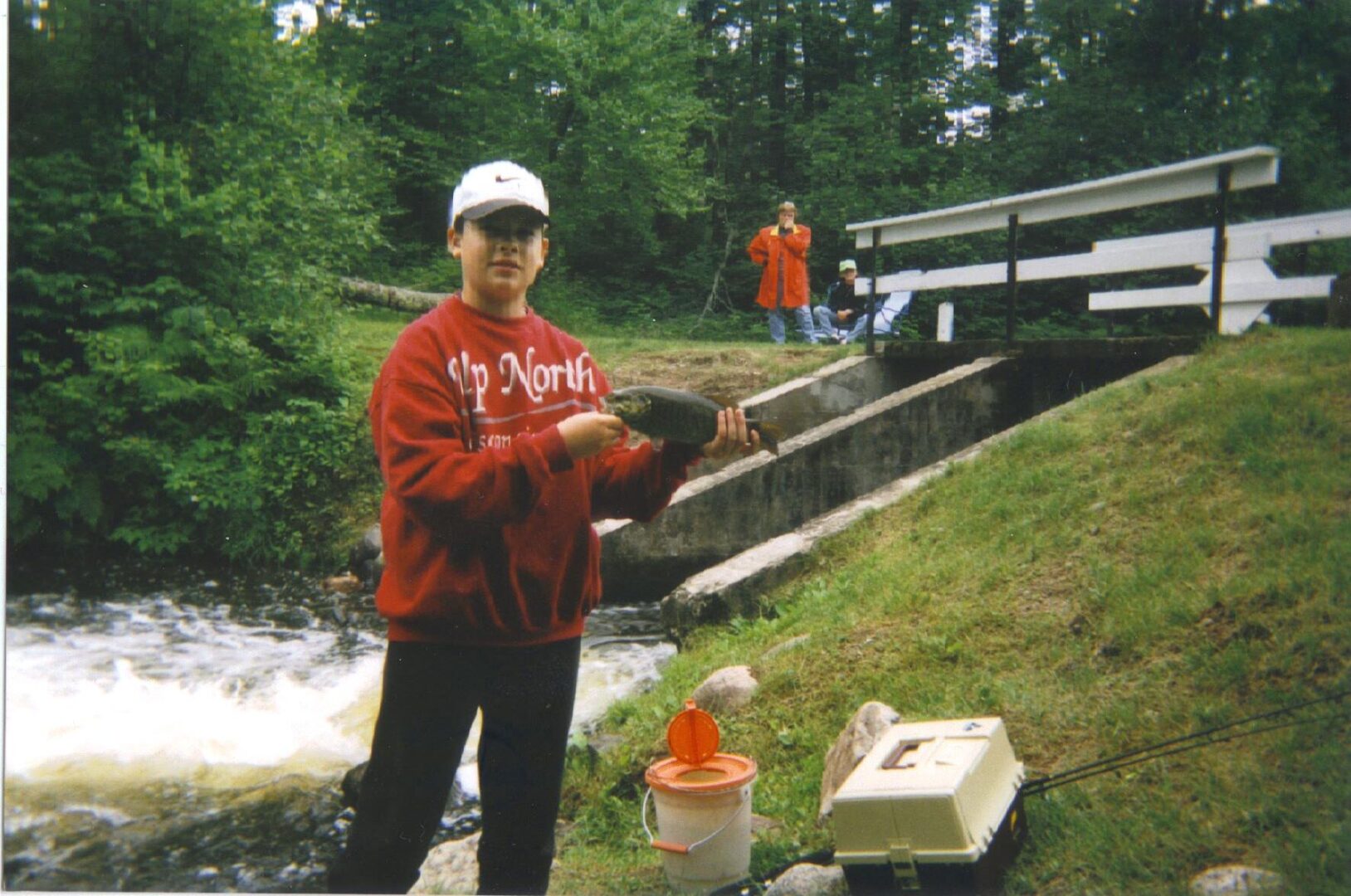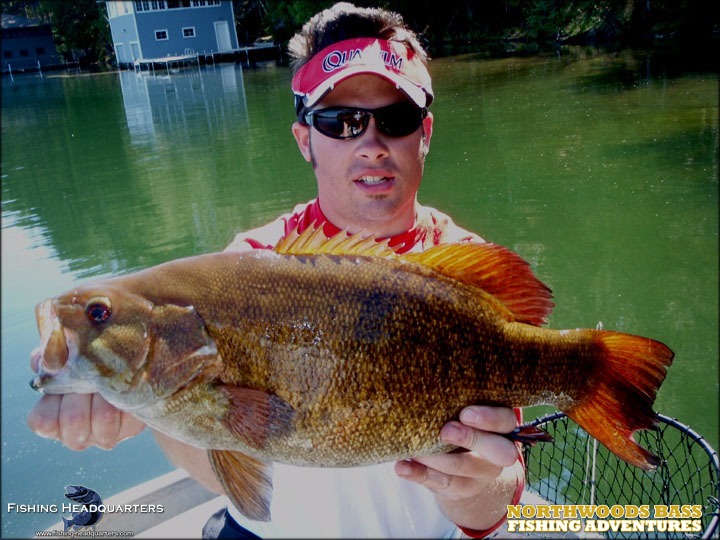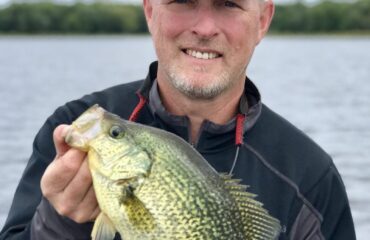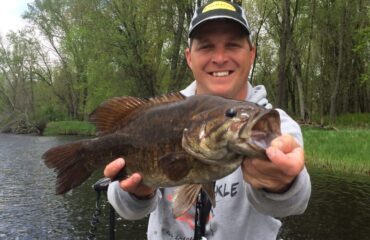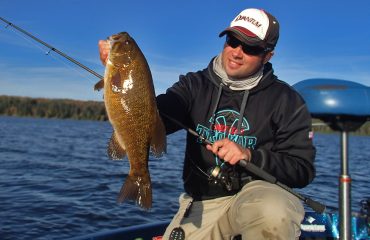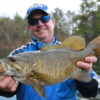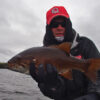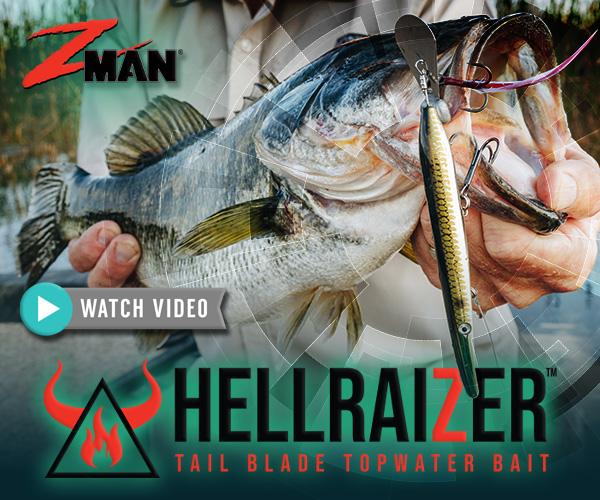My Smallmouth Story
Water flowed through a small spillway into the stream, sending a variety of fish species from the drainage lake above through its passage. I pitched a black and yellow marabou jig tipped with a leech into the spillway’s small tail-waters, letting the current do the rest of the work for me. Moments later, I felt a jolt that changed my life forever. This ten year old boy caught his first ever smallmouth bass.
It wasn’t large, maybe 2-pounds at most. But on light action gear with 4 lb. line in current, it felt and fought like a giant. It was the greatest fight from any fish I had experienced at that point in life. A life-changing moment occurred.
One Fish Two Fish Brown Fish….
A quarter-century ago, my obsession began. In the summer of 1996, exactly 26 fishing seasons ago.
The site of my first ever smallmouth isn’t any larger or much different from Dr. Seuss’s fictional hot-spot, McElligot’s Pool. It exactly was that, with the joy of it never knowing what you might catch. From it, we routinely pulled muskies, northerns, walleyes, and big panfish. The pool and its small stream located in the backwoods of Oneida County, Wisconsin is near and dear to me, where father and grandfather took me fishing as a child. It was their discovery, my inheritance.
Pursuits during the early days frequently took me to small rivers and streams like this where I could shore fish under adult supervision. Then came fishing the Minocqua area lakes while dad motored my ass around in our old 14-foot aluminum Mirro-Craft with a Johnson 10-horse. He’d catch his walleyes and mixed bag of multi-species, and I the frustrated walleye angler found a way to somehow catch nuisance smallmouths mixed in. If I thought a 2-pound river smallmouth from a spillway fought like hell, my first ever quality fish from a lake in 2003 fought even better on light spinning tackle from deeper water measuring 16 inches and weighing 3-pounds.
By the late 1990’s, I wasn’t much older than 12 or 13. Technology and mass-media communication was only in its infancy. Social media wasn’t yet in existence. And our local inland smallmouth fisheries were just beginning to expand with very few humans even knowing about them. I remember having an e-mail account before most other adults had one. One day after watching “Fishing with Joe Bucher,” my favorite local fishing program that aired on Newswatch-12, an NBC affiliate from Rhinelander, WI, I looked-up Joe’s new website and was compelled to write to him for advice and ideas of where to fish. Joe could have easily ignored this young boy’s e-mail, but took time from his busy schedule to respond in timely and thorough fashion like I was somebody important to him, sharing with me his filming experiences on local lakes and where I should fish around the Minocqua, WI area. I couldn’t believe it. Thanks to Joe Bucher, I got my start. I have that e-mail transcript saved somewhere.
Joe sent me to the Lac du Flambeau chain. Nowadays, I fish and earn my living from these waters 3 days a week.
During high-school years, the love affair grew exponentially further. When I got my driver’s license at 17 years old, with it came a lot of freedom whenever I had a vehicle available. Once in a while, I’d play hookey from school too without anyone finding out. I also purposely scheduled classes on Tuesdays and Thursdays only, so I could fish Mondays Wednesdays and Fridays. Or vice-versa, depending upon the semester. Trips to the Fox and DuPage Rivers and many remote creeks in Chicago’s far west suburbs were frequent spring and summer excursions whenever we weren’t up north. Illinois smallmouth fishing isn’t world class, but catching a dozen 12 to 16 inchers per trip back then was excellent per IL fishing standards. Fishing these rivers taught me the importance of reading currents, identifying river habitat, and how migration is necessary for the survival of river fishes – may the damn dams be blown up. I owe a lot of my earliest smallmouth lessons and success to the Illinois Smallmouth Alliance. Several years later in 2019, they requested my presence to be featured speaker at their annual Bronzeback Blowout fundraiser. My smallmouth obsession went full-circle, and what a thrill that was to share my passion and specialty with them.
Then the internet world and all of its resources drew me in further. In the early 2000’s, I discovered the existence of riversmallies.com. Back in its heyday, some of the best fishermen in the country belonged to its forum. It was professional and well-behaved compared to other fishing discussion boards like those Childs play we had for the Chicago area. I learned so much just by reading the fishing reports and works of Jeff Little, Bill Schultz, Jonn Graham, Mike Mladenik, and a host of other decorated and recognized smallmouth fishing. I wanted to be at their level someday. Online forums eventually went extinct in favor of Facebook where my personal network with fishing mentors and smallmouth experts grew exponentially further. I still keep in touch with those guys today.
Really afflicted with smallie fever during college years while a student at Loyola University Chicago, I then graduated from local rivers and transformed into a weekend warrior. This was my only opportunity for serious fishing trips in the northwoods when school was in session. Friends and family traveled northbound with me every-other weekend, and sometimes every weekend, where we’d fish 48 hours straight and explore new waters for big bass each trip. For 5 consecutive fishing seasons, we weekend warrior fished every spring, summer and fall. Lessons stockpiled and accumulated from each lake, river and stream visited during that era. Reflecting back on these adventures, I learned so much about all fish species and my lakes biology without the luxuries I have today that these DIY lessons were more invaluable than attending classes. If I hadn’t been a weekend warrior learning what would become my craft, I’m afraid there wouldn’t have been a bass fishing guide service in my future plans.
I learned all of my lakes with nothing more than paper maps and/or a black and white Garmin FishFinder 240. Would love to see how all of today’s newcomers to the sport could pull off the same without the luxuries and cheat codes of today.
During college I failed two writing courses, and I kept it secret for several years. If those writing professors who flunked me over assignments about political science and Disney book reports knew what I was doing today with fishing articles, they each wouldn’t believe it and would have a heart attack. The lesson here is you don’t excel at something if it weren’t for failures and learning from them. I strongly believe that if students only wrote about subjects they’re passionate about, in my case fishing, then everyone would pass with straight-A’s.
My Smallmouth Story
Study and don’t ever stop
Before he passed away in 2012, my late Great Uncle once lectured me, “Study!…. Study!….. Study!…. And don’t ever stop!” He was a well-accomplished doctor, turned painter, so I knew what he was talking about at age-95. I heeded his advice and never forgot his words. Greatest lesson I’ve ever received.
To know your subjects and master a craft, you must study and not forget. I got into reading fishing books and publications at a young age. If I wasn’t fishing somewhere, reading the works of incredible anglers was my primary education. I wanted to learn everything I could about smallmouth bass and all other fishing subjects I could absorb. So I intently consumed information from famous fishing heroes, authors, and idols that included the Lindners, Dick Sternberg, Matt Straw, Dave Csanda, Rich Zaleski, Gordon Pyzer, Billy Westmorland, Dan Gapen, Spence Petros, Joe Bucher, Russ Warye, and a litany of others whose names are less recognizable. When I can’t fish, mainly during winter months, I read extensively for the advancement of my own fishing education and brain’s functions. My home office is proof of obsession, where its book case shelves are filled with vintage and current publications and books. Knowledge is power and these lessons don’t come with an expiration date.
Following college graduation, my smallmouth obsession went into post-graduate studies during the 2010’s. I didn’t really know what I wanted to do with my life or where I wanted to go with my education. I had confidence that fishing in some capacity would become a huge part of life and career path, but that hadn’t yet been identified, so I let things come naturally without forcing events to happen. Luckily my primary career of website designer and working solely for myself enabled a fishing career to gradually evolve.
With more fishing freedom than ever, I was on a quest to find the holy grail of smallmouth bass for the first time ever beyond northern Wisconsin. Graduate school began in 2012. Whenever I get the opportunities to travel elsewhere, it’s still hard to leave my home waters. Trips and invitations took me to various regions of the Midwest and Great Lakes states where 20-inch smallmouths run rampant and aplenty. I befriended smallmouth guides on Chequamegon Bay, Green Bay, Southern Lake Michigan, Lake Erie, and elsewhere in Wisconsin. I learned that many of their diverse strategies worked just as well or better on my local Wisconsin trophy inland fisheries. Not only did I learn from these experts, but I think they also learned from me.
On other trips, partners and I made frequent summer season drive-to trips with boat in tow into Northwest Ontario to fish Lake of the Woods and Rainy Lake. For plentiful fish and potential of a Canadian monster, the northwest arm of Rainy Lake out of Camp Narrows Lodge has got to be the best Canadian smallmouth fishing destination for all-seasons fishing.
I learned so much by visiting all of these places – lessons coming from their anglers and their local culture. A decade later, their invitations keep coming.
So much water, such little time.
My Smallmouth Story
Home Sweet Home
Despite these travels and barely putting a dent into achieving my bucket-list of fishing trip destinations from 2012 through 2016, I always prefer fishing back home on the lakes and rivers in Wisconsin. For the fisheries diversity, lifetime of water, and potential for trophy fish there is no place else I’d rather be. I still haven’t visited every available quality smallmouth fishery yet!
I began hosting friends, fisheries biologists, and other smallmouth junkies most weekends. Throughout the 2010’s, other anglers took notice of my boat’s success, and soon guided trip requests started coming by email requests. I began guiding in the summer of 2016 and it’s been the second-best career decision I had ever made – behind self-employment as a website designer. Admittedly, I also began guiding as an excuse to accept those emails and phone calls and not turn anyone’s business away.
Some of my best big fish adventures took place with the partnership of Johnny Amato. An astute and detail-oriented trophy hunter whose best work has come from the waters of Forest County and Michigan’s Upper Peninsula, Johnny and I had amazing trips highlighted by multiple 6 to 7 lb. monsters before his musical career took off a few years ago. Together we did some damage. I caught the most, but Johnny caught the biggest with only his 6-pound fluorocarbon line and nothing else. Too many guide trips and musical gigs began conflicting with our schedules. These days, he enjoys making music videos and taking wildlife photographs instead.
If any region of the Midwest is a smallmouth epicenter I believe its right here in northern Wisconsin. Besides the local home-cooking of diverse fisheries and lake types, we’ve got a little bit of everything else within a reasonable drive away which includes Mille Lacs and the Upper Mississippi 4 hours west, Northwest Ontario 6 hours northwest, the Hayward area lakes and Chequamegon Bay a short 90 minutes west, Upper Michigan’s inland lakes a few counties north, Lake Michigan waters 3 hours east, the upper Wisconsin River 20 minutes down the road, and other regions of Wisconsin doable for day-trips.
How fortunate I am to have the largest concentration of inland freshwater lakes in the world right outside of our family cabin’s doorstep. Its smallmouth fisheries truly began and established in the 1990’s as a means to control rusty crayfish infestations. Many of those original specimens have expired, but continued generations of the start-up populations and the genetics of our original trophy specimens lives on.
Fishing pressure during peak seasonal periods has turned some lakes into a madhouse of weekend derbies and bumper boats. It seems that within a few years following my start in guiding, and after Wisconsin changed its culling rules to permit tournaments on inland waters, copy-cats popped up overnight and everyone started coming north. Pressure is excruciatingly high during spawning season when truckloads of anglers and bass boats commute north in traffic along US-51. Supply is still able to meet demand, but mismanagement and the expiry of big older fish is creeping in. We’re already seeing the impact and effects from bed harassment, depleting spawning recruitment, delayed mortality as a result of livewelling and over-handling, and a changing of strategies and new methods evolving as a result of these fishes popularity.
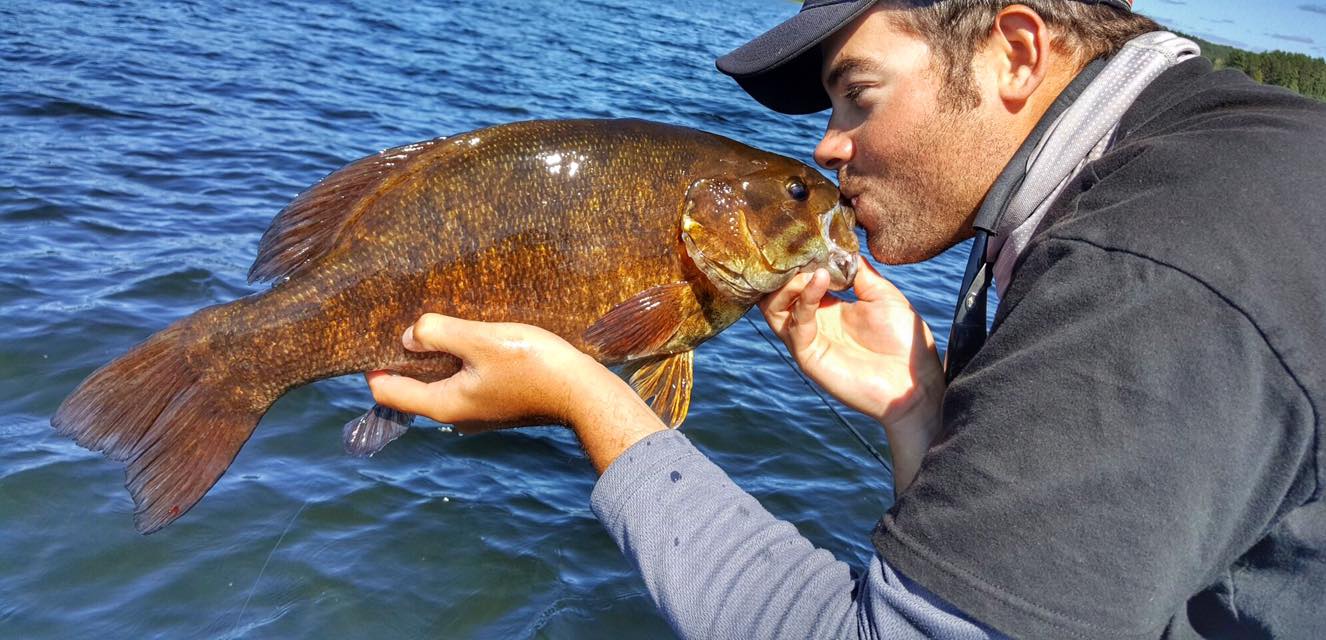
I’m Possessed
Big smallmouth bass are what I live for. My wife Amanda thinks I love smallmouth bass more than her some weeks of the year. She is right.
If you love smallmouth bass fishing like I do, love it completely and have no shame in showing it. Cherish the memories because fisheries and their big fish don’t live forever. Life is finite and fragile, and just because opportunity is there one day, it might not be the next. Never take a day of fishing for granted either.
Everything I’ve learned about smallmouths wouldn’t have been possible without experiencing a quarter century of bass class which includes time on the water, and lessons provided by some of the most renowned authorities in the subject. I am grateful for my education. Now I strive to reciprocate and be an angler for others like my mentors were for me.
At a younger age I was able to identify and find my passion. Today I do what I love to do, and that is go smallmouth bass fishing.
Do something you love and you’ll never work a day in your life.
Andrew Ragas splits time between the Chicago area and Wisconsin’s Northwoods. Based in Minocqua, WI, he specializes in trophy bass fishing and offers guided trips from May thru October. While big bass is the passion, he dabbles in multi-species as well. He may be visited online at www.northwoodsbass.com


